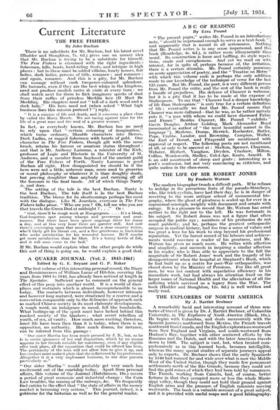" The present pages," writes Mr. Pound in an introductory
note, " should be impersonal enough to serve as a text-book ; and apparently that is meant in all seriousness. Nothing that Mr. Pound writes is in any sense impersonal, and this book (Routledge, 4s. 6d.), is rather more idiosyncratic than usual. Its construction is loose and baffling, its style repeti- tious, crude and cacophonous. And vet we read on with interest, for in spite of, perhaps because of, the irritation, there is a certain stimulus. Mr. Pound certainly possesses an acute appreciation of poetry, and the " Treatise on Metre " with which this volume ends is perhaps the only addition made to our knowledge of the technique of verse for the last 125 years. But Mr. Pound, the poet, is a very different person from Mr. Pound the critic, and the rest of the book is really a bundle of prejudices. His defence of Chaucer is welcome, but it is a pity that it has to be made at the expense of Shakespeare. To say that " Chaucer had a deeper knowledge of life than Shakespeare " is only true for a certain definition of life ; eventually we find that Mr. Pound means that Chaucer was more cultured—that he was, as he rather naively puts it, " a man with whom we could have discussed Fabre and Fraser." Besides Chaucer, Mr. Pound " exhibits " Gavin Douglas, Arthur Golding, Mark Alexander Boyd (nominated as author of " the most beautiful sonnet in the language "), Marlowe, Donne, Herrick, Rochester, Butler, Pope, Crabbe. Lander, and Browning. Campion, Waller, the Earl of Dorset, and Fitzgerald are mentioned with approval or respect. The following poets are not mentioned at all, or only to be sneered at : Skelton, Spenser, Chapman, Webster, Herbert, Vaughan, Dryden, Crashaw, Milton, Collins, Wordsworth, Shelley, Cok ridge, Keats, Arnold. It is an odd assortment of sheep and goats ; interesting as a poet's confession, but not very convincing as criticism, and quite useless in the class-room.






































 Previous page
Previous page